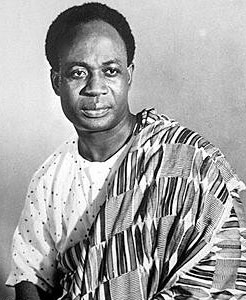This Day in History: August 3, 1956
Additional Date: August 3, 1956
In 1821, the British Government took control of the British trading forts. In 1844, Fanti chiefs on the Gold Coast (as Ghana was then known) signed an agreement with the British that led to the colonial status for the coastal area. In 1902, the British succeeded in establishing firm control over the Ashanti region and making the northern territories a protectorate. In May 1956, Kwame Nkrumah's Gold Coast government issued a white paper with proposals for Gold Coast's independence. On 3 August 1956, the Gold Coast Assembly adopted Kwame Nkrumah's resolution demanding independence from Britain. The British Government stated it would agree to a firm date for independence if a reasonable majority for such a step were obtained in the Gold Coast Legislative Assembly after a general election. The 1956 election returned the Convention People's Party (CPP) to power with 71 of the 104 seats in the Legislative Assembly. Ghana became an independent state on March 6, 1957, when Britain relinquished its control over the Gold Coast and Ashanti, the Northern Territories Protectorate, and British Togoland. After a long period of colonial rule, the newly elected Assembly of Ghana, passed a motion directing the government to demand independence from Britain. As the opposition party was not part of the debate, the motion was passed with unanimous vote. The motion was also accepted by the British Government as representing the majority of the Assembly. In 1957 Ghana became the first African country to gain independence. References: Ghana - History, from Mongaybay.com,[online], Available at: www.mongabay.com/ [Accessed: 31 July 2013] Tuesday, August 3. Highlights in history on this date [online] Available at: www.news24.com [Accessed: 31 July 2013]
